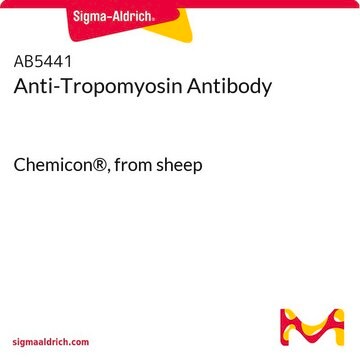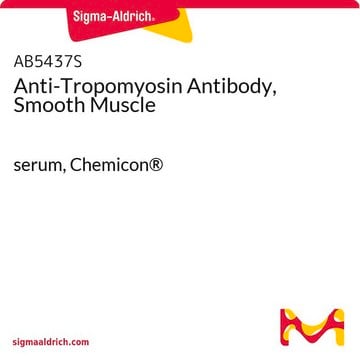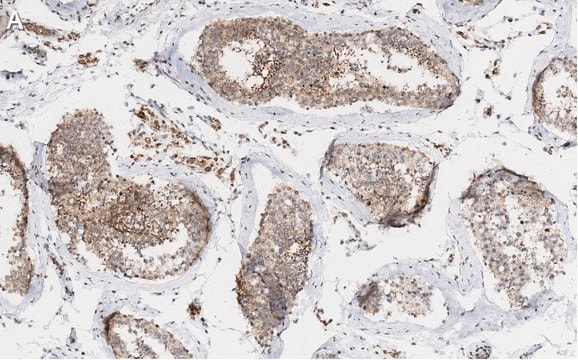T3651
Anti-Tropomyosin antibody produced in rabbit
whole antiserum
Sign Into View Organizational & Contract Pricing
All Photos(1)
About This Item
conjugate:
unconjugated
application:
IF
WB
WB
clone:
polyclonal
species reactivity:
chicken
citations:
9
technique(s):
indirect immunofluorescence: 1:40 using cultured chicken fibroblasts
western blot: suitable
western blot: suitable
Recommended Products
biological source
rabbit
Quality Level
conjugate
unconjugated
antibody form
whole antiserum
antibody product type
primary antibodies
clone
polyclonal
contains
15 mM sodium azide
species reactivity
chicken
technique(s)
indirect immunofluorescence: 1:40 using cultured chicken fibroblasts
western blot: suitable
UniProt accession no.
shipped in
dry ice
storage temp.
−20°C
target post-translational modification
unmodified
Gene Information
chicken ... TPM1(396366)
General description
Tropomyosin is a rigid, rod shaped protein, closely associated with actin filaments. In non-muscle cells grown in culture, tropomyosin is distributed periodically along the length of the stress fibers.
Specificity
The antibody specifically reacts with tropomyosin (typical banded pattern of stress fibers) in cultured cells and two tropomyosin bands of total chicken gizzard extract by immunoblotting.
Immunogen
smooth muscle tropomyosin from chicken gizzard.
Application
Anti-Tropomyosin antibody produced in rabbit has been used in western immunoblotting and immunofluorescence.
Disclaimer
Unless otherwise stated in our catalog or other company documentation accompanying the product(s), our products are intended for research use only and are not to be used for any other purpose, which includes but is not limited to, unauthorized commercial uses, in vitro diagnostic uses, ex vivo or in vivo therapeutic uses or any type of consumption or application to humans or animals.
Not finding the right product?
Try our Product Selector Tool.
Choose from one of the most recent versions:
Already Own This Product?
Find documentation for the products that you have recently purchased in the Document Library.
Differentiation of CD45?/CD31+ lung side population cells into endothelial and smooth muscle cells in vitro
Xu Y, et al.
International Journal of Molecular Medicine, 43(3), 1128-1138 (2019)
K Miyado et al.
Biochemical and biophysical research communications, 225(2), 427-435 (1996-08-14)
Tropomyosin is an actin-associated cytoskeletal protein expressed in muscle and non-muscle cells. There are several tropomyosin isoforms, and their cellular expression is known to be associated with transformation events caused by retroviral infection and chemical mutagens. We found that expression
Jürg P F Nüesch et al.
Journal of virology, 80(10), 4729-4739 (2006-04-28)
During a productive infection, the prototype strain of the parvovirus minute virus of mice (MVMp) induces dramatic morphological alterations in permissive A9 fibroblasts, culminating in cell lysis at the end of infection. These cytopathic effects (CPE) result from rearrangements and
Fang Wang et al.
Journal of biomedicine & biotechnology, 2011, 435271-435271 (2011-12-22)
Familial hypertrophic cardiomyopathy (FHC) is a disease of cardiac sarcomeres. To identify molecular mechanisms underlying FHC pathology, functional and structural differences in three FHC-related mutations in recombinant α-Tm (V95A, D175N, and E180G) were characterized using both conventional and modified in
Yang Xu et al.
International journal of molecular medicine, 43(3), 1128-1138 (2019-01-11)
Side population (SP) cells are a small subpopulation of cells found in many mammalian tissues and organs, identified by their capacity to efflux Hoechst 33342 dye. They are enriched for stem/progenitor cell activity. SP cells isolated from the adult mouse
Our team of scientists has experience in all areas of research including Life Science, Material Science, Chemical Synthesis, Chromatography, Analytical and many others.
Contact Technical Service








